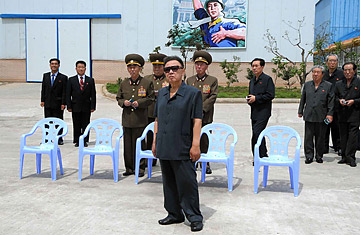
North Korean leader Kim Jong Il visits the newly built Taedonggang Tile Factory in Pyongyang
North Korea does not appear to be in the strongest of bargaining positions. The country's Dear Leader, Kim Jong Il, may be dying, afflicted with pancreatic cancer, according to some accounts. His designated successor is his youngest son, about whom next to nothing is known except that he is in his 20s. There are reports of a power struggle now under way in Pyongyang, as the leadership faces the prospect of life without Kim.
But even in the murkiest of moments, the world's most opaque regime always, as if by reflex, reverts to a familiar playbook. In the seven months that Barack Obama has been U.S. President, North Korea has been unrelentingly hostile, testing long-rang missiles and a nuclear bomb amid constantly belligerent rhetoric. Now, having backed its way into this bleak geopolitical corner, Pyongyang says it might want to talk.
Not, mind you, in the context of the so-called six-party talks, the futile diplomatic dance that over the past five years has failed to prod the North into surrendering its nuclear weapons. Kim and Co. in April declared that forum dead and buried, and did so again on July 27 in the form of a statement from the Foreign Ministry. But at the end of that same statement, Pyongyang cryptically added, "There is a specific and reserved form of dialogue that can address the current situation."
With that teaser, North Korea repeated the pattern of behavior it has honed since the early 1990s: rant, provoke, then hint that peace and reconciliation are possible — if it gets what it wants. The message appeared to mean that the North wants to sit down face to face with the U.S. During the Bush years, Washington never agreed to a formal bilateral dialogue. But the North has always wanted to sideline the South Korean government in Seoul, with whom it has never signed a peace treaty, as well as the Japanese government, which regime founder Kim Il Sung fought to dislodge as occupier of the Korean peninsula.
The Obama Administration came into office open to the idea of bilateral negotiations, if such talks held out the prospect of Pyongyang giving up its nuclear program. For now, though, the Administration is wary, and not just because the North has been so consistently hostile. A State Department spokesman, Ian Kelly, said the U.S. is open to direct negotiations with Pyongyang, but "only in the context of the six-party talks." This position is no different from that of the Bush Administration. There were several occasions during the six-party talks when North Korean diplomats spoke directly, albeit informally, to U.S. negotiators with no one else in the room.
Now, however, the context is very different, diplomats and intelligence officials caution. "It's very possible that we're looking at the prospect of North Korea without Kim Jong Il," a diplomatic source told TIME. "If he's as sick as some reports indicate, we're looking at a very uncertain future." Intelligence reports earlier this year spotlighted Chang Sung Taek, Kim Jong Il's brother-in-law, as the likely "regent" in a post-Kim world, riding herd over Kim Jong Un, the 20-something who is likely to be the Dear Leader's successor. But sources say there is now increasing uncertainty as to how much authority Chang may actually have, now or in the future. An intelligence official told TIME that his belief is that "Chang doesn't have the clout to hold things together should Kim suddenly depart the scene. He's got too many enemies." Nor is it clear that any one figure in the military has the political heft to effectively take over.
All of this makes the prospect of re-engaging with Pyongyang trickier than ever. U.S. Secretary of State Hillary Clinton was correct last week when she said that North Korea now "has nowhere to go." It must return to negotiations in some forum. But with questions intensifying about just how long Kim will be around, and what might come next should he die, the Obama Administration's current caution is understandable. Whatever thoughts it may have had about a Grand Bargain on North Korea's nukes have been set aside for the moment. Said a diplomatic source: "Everyone ... is back to trying to figure out the most basic things about [the regime]." Establishing bilateral talks "might help in that exercise," he said. But when that might happen, "no one knows," the source said. "At this point, we're probably going to have to have talks with them about the format of the talks." In other words, it'll probably take a while — assuming, that is, that the Dear Leader has a while.
Download the new TIME BlackBerry App at app.time.com
